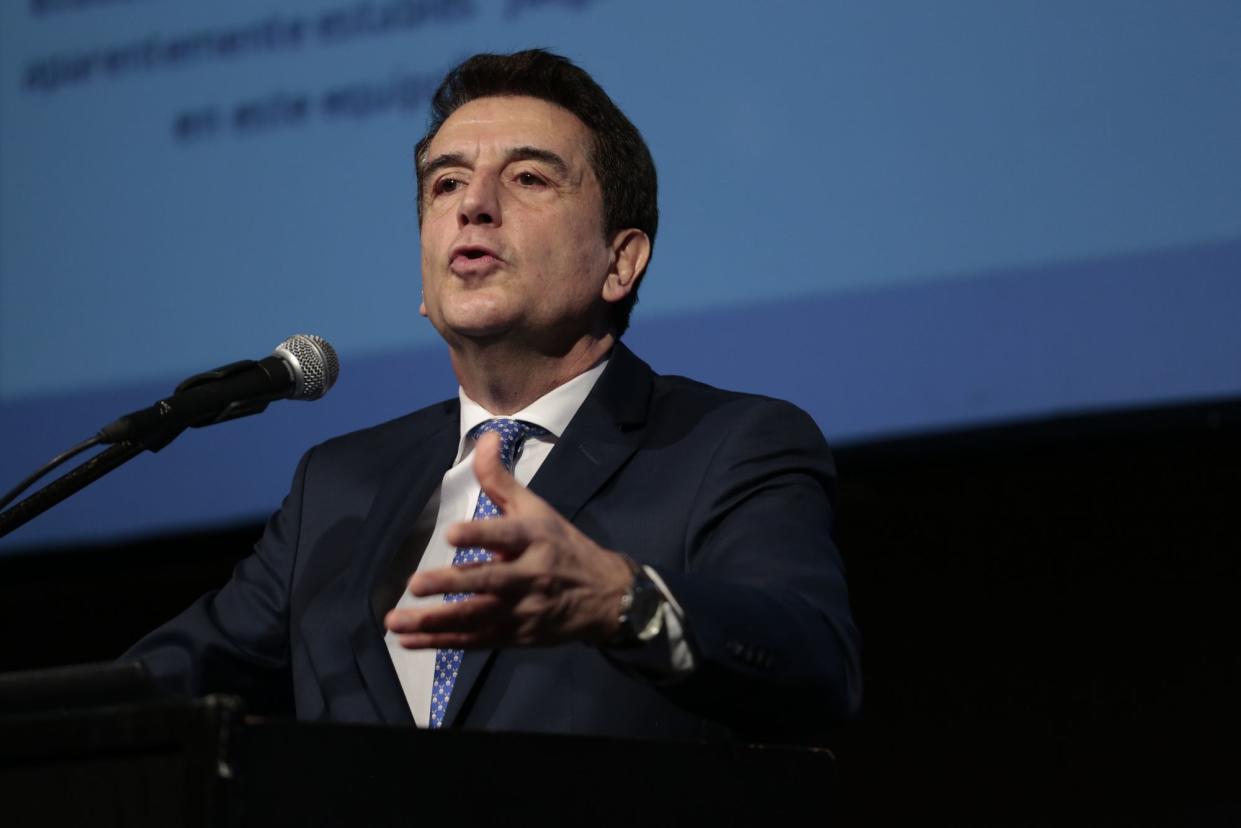Argentina Must Avoid ‘Hot Money’ Pitfall, Top Economist Says

- Oops!Something went wrong.Please try again later.
- Oops!Something went wrong.Please try again later.
- Oops!Something went wrong.Please try again later.
(Bloomberg) -- An Argentine economist drafting recommendations for a more business-friendly government that could emerge from 2023 elections has a message for foreign investors eyeing potential regime change.
Most Read from Bloomberg
One of World’s Most Crowded Cities Gets First Mass-Transit Rail
US Weighs Sending Bradley Fighting Vehicles to Bolster Ukraine
Wall Street’s Top Stars Got Blindsided by 2022 Market Collapse
“We’re not interested in hot money in Argentina,” Carlos Melconian, head of think tank IERAL, said in an interview at his Buenos Aires office. “Capital inflows that create quick profits and get confounded with the element of confidence don’t interest us.”
Melconian, who was previously head of state-run Banco de la Nacion Argentina, is crafting an economic plan for the next government that would address Argentina’s many problems, from 100% inflation and a cobweb of currency controls to anti-business labor laws and poverty near 40%. His plan would also attempt to avoid some of the early policy mistakes of the last market-oriented administration of Mauricio Macri, who lost the 2019 elections to President Alberto Fernandez after early reforms failed to stave off a fresh crisis.
Although fine print details aren’t public yet, a few key policies are off the table in Melconian’s plan for the start of a new government. Inflation targeting and a free-floating exchange rate — two policy pillars of Macri’s first days in office in late 2015 — can’t happen after the next government takes the reins, Melconian says, calling those measures “inadequate.”
He suggests a new government make investors hold Argentine assets for a certain time period before selling to avoid the rapid fluctuations that helped fuel market volatility in Macri’s government, or “hot money” often associated with quick profits and speculation from wild currency moves. He stopped short of defining exactly how long investors should have to wait.
After initial success in stabilizing the economy, settling with holdout creditors, returning to global bond markets and removing onerous controls, Macri’s government suffered a crisis of confidence midway through the four-year term and was forced to turn to the International Monetary Fund for a record $56 billion bailout. After Macri was pummeled in primaries in 2019, he was forced to reimpose certain controls as investors quickly pulled money from the country.
Read more: Argentina Central Bank Sees Inflation Bouncing Back in December
To be clear, there’s no hot money in Argentina right now due to stifling currency controls. During the pandemic, Fernandez’s government defaulted and then restructured its debt, but with current dollar bond yields around 20%, the country is effectively locked out of international markets. Investors’ appetite on returning to Argentine assets hinges heavily on the next government’s economic policies.
More broadly, Melconian sees a new era of economics for crisis-prone Argentina following this election cycle.
“In politics, they say that a political cycle is ending because it’s the finale of populism,” said Melconian. “We’re saying that an economic model is ending, one that can’t hold up any longer.”
The end of Fernandez’s government and the current economic model won’t be easy as Melconian sees 100% annual inflation from January until at least the primary vote in August, with more reasons to think it’ll go higher than lower.
Early Candidates
Along with what he estimates to be 60 to 70 big thinkers — economists, lawyers, tax experts — some of whom are also contenders for a future cabinet job, Melconian is one of the architects behind the plan he describes as “capitalist, Western and progressive.”
At first, “Argentina isn’t going to answer what it does with currency controls,” he said. “Argentina has to answer, what’s it going to do about the way that business is conducted in the country?”
Melconian is often linked in the local press to Patricia Bullrich, a conservative leader in the opposition coalition expected to contend in the elections. Buenos Aires Mayor Horacio Rodriguez Larreta, seen as more centrist than Bullrich, is also preparing a run for the presidency. Liberal economist Javier Milei, who is portraying himself as anti-establishment, is also relevant in recent polls.
Melconian insists his plan is apolitical, not tied to a single opposition candidate. But with Fernandez’s popularity sinking and Vice President Cristina Kirchner already declaring she won’t be a candidate, Melconian sees an opening for the opposition to win next year’s election.
“It’s an opposition that absolutely continues to have a penalty shot in their favor without a goalie guarding the net,” Melconian says.
Most Read from Bloomberg Businessweek
Futuristic Vertical Farming Startups Are Struggling in the Tech Downturn
The Two-Word Mantra That Changed Bank of America’s Risk Culture
Drugmakers Are Testing Ways to Stop Alzheimer’s Before It Starts
©2022 Bloomberg L.P.


